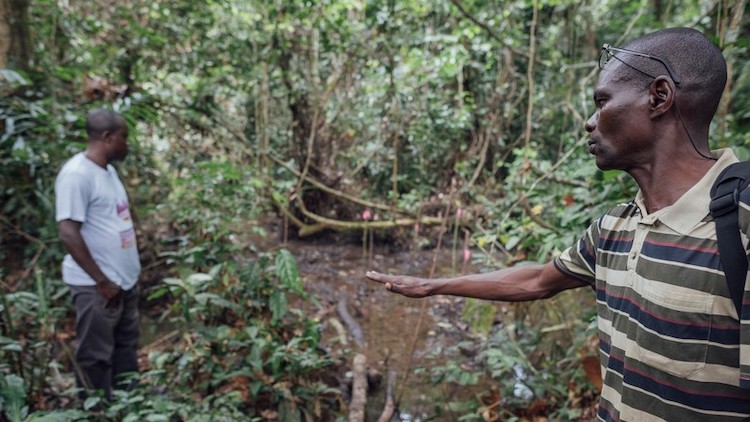By Lisa Vives, Global Information Network
NEW YORK | 28 November 2023 (IDN) — Is nothing sacred? That seemed to be the question posed by Jean Bolengu Ekunja, chief of the village Baringa in the Congo basin forest.
“We won’t compromise!” he was reported to say to a crowd as he drove his spear into the ground. “If oil activity is what they are going to do here, they will have to kill me first.”
Baringa is one of scores of communities affected by plans unveiled by the Democratic Republic of Congo (DRC) which is auctioning rights to explore for oil in large swathes of rainforest and other protected areas across the country.
The government says the country may have up to 16 billion oil barrels, and some of those reserves lie under the rainforest. Experts say the project is a “carbon bomb” that threatens one of the last and most critical frontiers in the battle against climate breakdown: the Congo Basin rainforest.
The process has sparked a fierce yet familiar debate about the environment and set the stage for a legal fight over community rights.
DRC’s hydrocarbons minister, Didier Budimbu, is a man who has been in prison in Belgium for fraud, according to the London-based Bureau of Investigative Journalism (BIJ). He says the country needs to extract its oil and gas “so that our children can eat and we can develop our economy”.
It is the latest attempt to exploit fossil fuel resources in one of the world’s poorest countries, where almost two-thirds of people survive on less than $2 a day, the international poverty line.
Scandals
Many previous attempts to exploit DRC’s fossil-fuel reserves were beset with scandal and officials canceling contracts.
While the DRC has promised the auction will be transparent, impartial, and competitive, an investigation by the reporters’ group revealed a process plagued with apparent preferential treatment and backroom deals.
Some of the oil blocks up for auction lie within the Congo Basin rainforest, where many small farms and fishing communities can be found. DRC law requires the government to get the opinion of local people before any project or activity that may impact the environment. Yet, people here say they have not been asked about the auction.
Other farming villages further upstream from Baringa are just learning about the oil deals from outsiders with phone networks and radio coverage. Nadine Bolumbu, chief of Lisoko and six neighboring villages said they learned about the auctions from Greenpeace. “We owe our survival to the forest,” she told an investigator. “We refuse oil exploitation in our group.”
Auction not without domestic support
But the auction is not without domestic support. Some argue that the DRC has a right to use the proceeds from its natural resources and that doing so could drive development in one of the world’s poorest countries.
Who is most at risk from this auction?
According to the journalist group, there are 75 million people from more than 150 ethnic groups who live in the Congo Basin’s forests and whose futures depend on the health of their surroundings.
But in the long term, they say, all of us are at risk. Suppose the exploitation of this land goes ahead. In that case, the implications for the climate are huge: the Congo Basin is a vital resource in attempting to balance out the planet-heating CO2 we continue to emit.
Meanwhile, election fever is heating up in the DRC with elections expected to be held on Dec. 20. So far, there are twenty-two registered candidates, among them the incumbent Felix Tshisekedi, Martin Fayulu, widely viewed as the winner of the last election round, and Congolese gynaecologist and Pentecostal Pastor Denis Mukwege, winner of the 2018 Nobel Peace Prize.
Their views on the oil auctions is not yet determined. [IDN-InDepthNews]
Photo: Corneille Ewango, a Congo forest expert from the University of Kinsangani, DRC, carries out scientific research at the peatlands. Credit: Kevin McElvaney, Greenpeace. Source: Climate Home News.
IDN is the flagship agency of the Non-profit International Press Syndicate


